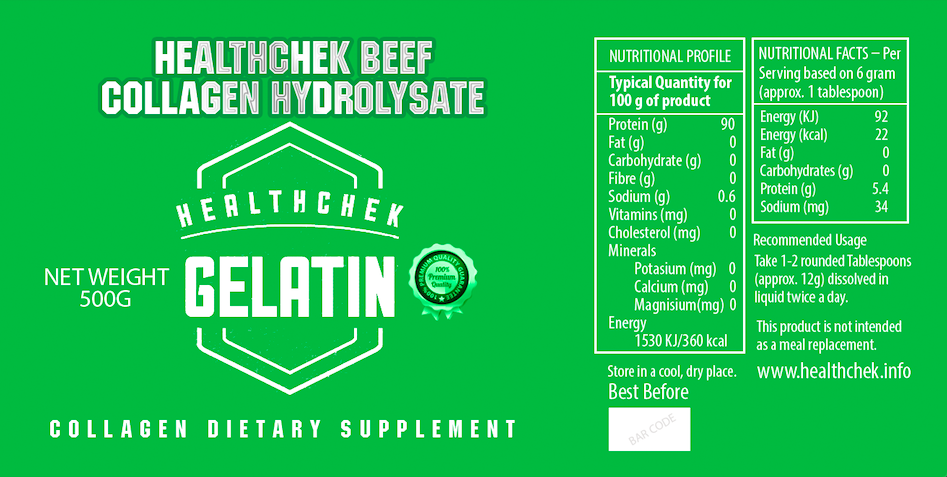What is Collagen Powder?
What is collagen powder? And why is Healthchek Collagen a molecular weight of 2000 daltons?
Collagen powder is a supplement derived from animal connective tissues, often skin, bones, and cartilage. Collagen is a structural protein that is a crucial component of various tissues in the body, including skin, bones, tendons, ligaments, and more. It provides strength, elasticity, and structure to these tissues.
The molecular weight of collagen varies depending on its source and the specific type of collagen. Collagen molecules are large proteins, and their molecular weights can range from thousands to hundreds of thousands of daltons.
Regarding a molecular weight of 2000 daltons, this is notably smaller than typical collagen molecules. A molecular weight of 2000 daltons is more in line with small peptides rather than intact collagen. Collagen peptides, also known as hydrolyzed collagen, are smaller fragments of collagen that result from the hydrolysis of larger collagen molecules. These peptides are easier for the body to absorb.
The product contains highly hydrolyzed collagen peptides to enhance absorption and bioavailability, it also avoid digestive issues that some suffered with other high dalton brands. Collagen supplements can vary in terms of source, processing methods, and additional ingredients, some of the big protein companies offer cheaper products with added sweeteners for example.
What research has been conducted in regards to collagen and health?
Collagen supplementation has been the subject of various studies, and it has been researched for its potential benefits in addressing several health issues. It's important to note that while some findings are promising, more research is often needed to establish conclusive evidence. Here are some health issues that collagen supplementation has been studied for:
Skin Health:
Collagen is a major component of the skin, and there is evidence suggesting that collagen supplementation may improve skin elasticity, hydration, and overall appearance. It may also help reduce wrinkles and signs of aging.
Joint Health:
Collagen is a crucial component of cartilage, which is found in joints. Some studies suggest that collagen supplementation may help reduce joint pain and improve symptoms of osteoarthritis.
Bone Health:
Collagen is a structural protein in bones. While more research is needed, some studies have explored the potential of collagen supplementation in promoting bone health and preventing bone loss.
Muscle Mass and Strength:
Collagen is present in muscles, and there is some research suggesting that collagen supplementation, especially in combination with resistance training, may help increase muscle mass and strength.
Gut Health:
Collagen contains the amino acid glycine, which is believed to support gut health. Some studies have explored the role of collagen in promoting a healthy gut lining and reducing symptoms of conditions like leaky gut syndrome.
Hair and Nail Health:
Collagen is also a component of hair and nails, and there is some evidence to suggest that collagen supplementation may contribute to healthier hair and nails.
Wound Healing:
Collagen is involved in the formation of the extracellular matrix, which plays a role in wound healing. Some studies have investigated the potential of collagen supplementation in promoting faster healing of wounds.
It's important to recognise that individual responses to collagen supplementation can vary, and the effectiveness of collagen for specific health issues may depend on factors such as the type of collagen, dosage, and individual health conditions. Before starting any supplementation, it's advisable to consult with a healthcare professional to determine whether it's suitable for your specific needs and circumstances.
Dosage?
The recommended daily dosage of collagen can vary depending on factors such as age, health status, and the specific health goals you're aiming to achieve. There isn't a universal standard for collagen intake, and the optimal dosage may differ based on individual needs.
However, many collagen supplements on the market typically suggest a daily serving size that ranges from 5 to 15 grams, Healthchek recommends 12g, and I personally use 15 grams per day. It's essential to follow the instructions provided on the product label or consult with a healthcare professional for personalised advice.
If you're looking to address specific health concerns, such as joint pain or skin aging, you may find varying recommendations in the existing research. For example, some studies exploring the benefits of collagen for skin health have used doses ranging from 2.5 to 10 grams per day.
It's worth noting that collagen supplements often come in the form of powders, capsules, or liquid formulations, be wary of highly priced products that contain minimal amounts, a powder is the optimal way to ensure you are getting what you pay for.
As with any supplement, it's important to approach collagen supplementation with caution, especially if you have underlying health conditions or are taking other medications. Many make outlandish claims, but that isn’t allowed (they still do it however). Collagen is a safe and important form of protein but it should be supplemental to enhance and optimise rather than utilised as a sole protein source or in the belief that it will be a magic bullet. Consulting with a healthcare professional (such as myself) before starting a new supplement regimen can help ensure that it aligns with your overall health and wellness goals.

